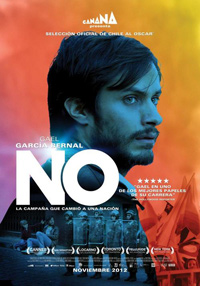Reviews
No | Review
Just Say It: Larrain’s Final Entry In Pinochet Trilogy a Knockout
 Heralded as the last and also lightest film in Chilean auteur Pablo Larrain’s Pinochet trilogy, No does indeed emanate a light heartedness, mostly because it depicts the positive result based on the possibilities of hope. But its lightheartedness may seem only evident after your familiarity with the fact that that it follows sister films Tony Manero (2008) and Post Mortem (2010), which take place at the onset and in the midst of Pinochet’s dictatorship of Chile. While Manero plays like horrific nightmare and Mortem a surreal descent into one, Larrain’s latest manages to be the most emotionally potent for its light at the end of the tunnel, and the possibility of reconstruction.
Heralded as the last and also lightest film in Chilean auteur Pablo Larrain’s Pinochet trilogy, No does indeed emanate a light heartedness, mostly because it depicts the positive result based on the possibilities of hope. But its lightheartedness may seem only evident after your familiarity with the fact that that it follows sister films Tony Manero (2008) and Post Mortem (2010), which take place at the onset and in the midst of Pinochet’s dictatorship of Chile. While Manero plays like horrific nightmare and Mortem a surreal descent into one, Larrain’s latest manages to be the most emotionally potent for its light at the end of the tunnel, and the possibility of reconstruction.
Set in 1988, due to increasing international pressure, Chilean military dictator Augusto Pinochet is forced to call a plebiscite on his presidency. The people, for the first time, will have the ability to vote Yes or No to the dictator extending his rule for another eight years. Of course, even such a lofty democratic move such as this from Pinochet was proposed because there didn’t seem a glimmer of possibility that he could possibly lose, and much of Chile’s youth assumed that the vote would be rigged. For 27 days before the election, each campaign was allowed to run 15 minutes of footage on national television to argue for their campaign.
As hopeless as it would seem to convince the youth vote that their voices count and an older generation that change doesn’t equate to even darker political possibilities, opposition leaders for the No campaign persuade a confident and young advertising executive, Rene Saavedra (Gael Garcia Bernal), to head up their campaign. Saavedra, himself a prior exile due to his father, is more than willing to take up the cause. His ex-wife and mother of his child, Veronica (Antonia Zegers), is an active radical, often in and out of jail for protesting and she chides Rene for his hopeful ideals and seriousness about taking on such a hopeless venture. At his advertising firm, Rene’s oily boss, Lucho Guzman (Alfredo Castro) is politically opposed to the No campaign, and when he becomes aware of Rene’s involvement, followed by the initial successful responses to Rene’s positive, hopeful campaign, he secretly heads up the Yes side. As Saavedra and his popular strategies with the No campaign, including a popular jingle, seem to resonate more and more the public, Pinochet’s crew insidiously begin to do what they know best and undermine the opposition.
For the purposes of condensing this historical moment for a narrative film, Larrain combined several real life people into a handful of notable characters, as well as toned down most of the in-house strife that happened behind the scene of the No campaign. While everything Saavedra suggests concerning the campaign logistically makes sense, there’s a constant nagging reminder that a lot more is riding on it than anyone wants to believe. In a sense, they have to fool people into a positive frame of mind so they can find the motivation to come together to make their lives better. The atrocities of the Pinochet regime are never far from the surface, intimidation knocking at each attempt to move forward. Larrain once again casts Alfredo Castro as an antagonist again, here as Saavedra’s slimy boss, perhaps more lonely than he may be actually committed to the continuation of Pinochet.
At the film’s emotional center is an engaging performance from Gael Garcia Bernal, as warm and extremely likeable as ever. His scenes with Zegers (a regular Larrain cast mate) and their child are as emotionally provoking as they could be considered banal, whether it be discovering the technological payoff of the microwave or handing his kid over to his ex and her new beau for safekeeping when terroristic threats enter the picture.
No is shot on 30 year old Umatic video, which seems a bit jarring at first, but quickly blends seamlessly with the time period and helps with the large amount of archival footage Larrain uses to propel the narrative. For anyone at all familiar with Chilean history, one can’t help but be amazed at the accomplishment of the 1988 No campaign. As the final film in an amazing trilogy, No feels like a blazing beacon, until you see the footage of a group of mothers coming together to speak of their sons, “the disappeared,” in moments of archival footage, and find that there’s no end to the depth of profound sadness underlying it all. No exudes the same advertising tactics as Saavedra’s campaign, the less it attacks our senses, the more moving it becomes.
































